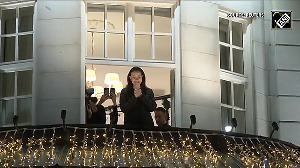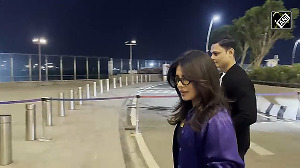'India-US relations are so good today that even a presidential visit cannot spoil them,' Stephen Cohen of the Brookings Institution said in an Asianet interview in Thiruvanthapuram this week.
But the official and scholarly pronouncements from Washington the same week seem to suggest that the visit may be rich in symbolism, but poor in substance.
The expectations on the two sides are so divergent that disappointment is inevitable for both.
The White House lined up a formidable array of officials to outline what to expect from the visit. Press Secretary Robert Gibbs, Under Secretary of State for Political Affairs William Burns, Deputy National Security Adviser for International Economic Affairs Mike Forman and Deputy National Security Adviser for Strategic Communication Benn Rhodes dealt in detail with their respective turfs.
The briefing was preceded by the unveiling of a Carnegie Report by George Perkovich for a reality check on bilateral relations.
There was no dearth of op-ed articles and comments on the visit in the Indian media, with expectations ranging from zero to a November Santa Claus slipping down the chimney with a bag full of goodies. Washington was not, therefore, unaware of the buzz in India.
The blunt statement by Gibbs at the White House briefing that 'the trip is economic in focus' must have bewildered the Indians, who have been writing more about Obama's quest for an Af-Pak strategy and his likely declaration in support of India's aspirations to be a permanent member of the UN Security Council.
It has now become clear that even if there is any satisfaction on these issues, the motive is not to strengthen the strategic partnership, but to increase exports, seek investments and to create jobs to bolster the US economy.
Questions on Afghanistan came at the end of the briefing after questions on trade, including nuclear, increasing Indian investments in the US and the environment and even Myanmar and Iran. No regional solution was sought or advanced.
Support of India's role in Afghanistan was limited to the USD 1.3 billion in development assistance.
On India's wish to see the US continuing to fight in Pakistan, Perkovich commented sarcastically: 'India is willing to fight to the last American to keep Pakistan from exerting direct control over a future Afghan government.'
President Obama may consult Prime Minister Manmohan Singh on the larger issues of war and peace in the region. But he obviously has no blueprint to share and the Af-Pak strategy will remain hidden from India.
On the permanent membership of the Security Council, Under Secretary Bill Burns was willing to go only this far: 'India will be a central part of any consideration of a reformed Security Council.'
It was pointed out that India was inducted into the G-20 precisely because India should be a player in global governance. In other words, there is no evolution in the US position since the strategic dialogue in July.
Moreover, he brought up the question of efficiency, the main argument against expansion. He also put India on notice when he said that India's next term in the Security Council will provide an opportunity for the US to work with India in the Council.
The reason for the reluctance to make a declaration of support beyond this is explained in the Carnegie study. India's position on global issues like non-proliferation and human rights are divergent; India still votes with the US in the UN General Assembly only 20% of the time etc.
India understands that even if President Obama gives India a blank cheque, it cannot be cashed in New York, but it would have contributed to the atmospherics if such a cheque was presented.
India's expectations on eliminating technology denial did not figure prominently in the briefing. While the United States is seeking a level playing field in India for its exports, including nuclear, it is quite willing to maintain controls on export of technology and use the tax system to discourage outsourcing.
Any deal that the US is willing to make on these issues is tied to job creation in the United States and not to the strategic partnership or creation of goodwill.
The questioning revealed unease that unsuspecting Americans had to confront strangers in distant lands when they made local enquiries on the phone.
The White House saw a glimmer of hope in India signing the Convention on Supplementary Compensation in Vienna on the eve of the visit, thereby diluting the suppliers' liability, which has been introduced in Indian law. But it would be left to the private companies to find the right arrangements to facilitate nuclear trade.
President Obama would very much like the nuclear deal to be seen more as a measure for bilateral cooperation rather than a step towards legitimising India's nuclear weapons capability or a way to sidestep the NPT.
For him the deal was meant to remove a major irritant in bilateral relations so that business could flourish.
The fine line on Pakistan was drawn very clearly to state that there would be no zero sum dynamics in the US attitude to the two countries. The promise of a visit to Pakistan next year was not linked to any re-hyphenating, but it was obvious that President Obama could not have visited India without being specific on a visit to Pakistan.
The emphasis would be on bilateral dialogue to resolve problems and there would be no new policy on Kashmir.
The counter-terrorism partnership would continue with both the countries and no weightage would be given to the evidence of Pakistan's complicity in terrorism against India.
Intelligence would be shared, but anything that would reveal the ISI hand would remain out of bounds for India.
Symbolism will be very much there in the visit. Staying in the Taj Mahal hotel in Mumbai, meeting relatives of the terror victims, visiting the Gandhi museum, the Humayun's tomb and Raj Ghat are carefully chosen gestures.
Avoidance of the negative symbolism of the President with a head cover in the Golden Temple was, of course, attributed to time constraint.
But 'the economic message is very clear, the market potential is clear', as stated by the White House in no uncertain terms.
No briefing will reveal the whole truth as officials would not wish to steal the thunder from the President, who may like to make pronouncements and announcements on the spur of the moment in response to the warmth of the hospitality and the strength of the arguments of his host.
It was also imperative to convince the domestic audience on the eve of the elections that he was making the trip not to give away gifts, but to gain wealth and jobs for the Americans.
But if the White House briefing and the think-tank study are any guide, much should not expected in terms of strengthening the strategic relationship. A less romantic and more business like relationship is in the offing.
T P Sreenivasan is a former ambassador of India to the United Nations, Vienna, and a former Governor for India at the International Atomic Energy Agency, Vienna.
He is currently the Director General, Kerala International Centre, Thiruvananthapuram, and a Member of the National Security Advisory Board.
MUST READS: What Obama MUST experience in Mumbai
Michelle Obama's Indian shopping list!
What Obama will tell Indian business
'I don't think Obama's visit will be a success'
Why India is the first stop for Obama
Revealed: What Obama will do in India
Obamania hits Delhi, but all's quiet in Rajghat
Cost of Obama's Delhi trip: Rs 15 lakh per hour
India's future lies in its hands, not America's









